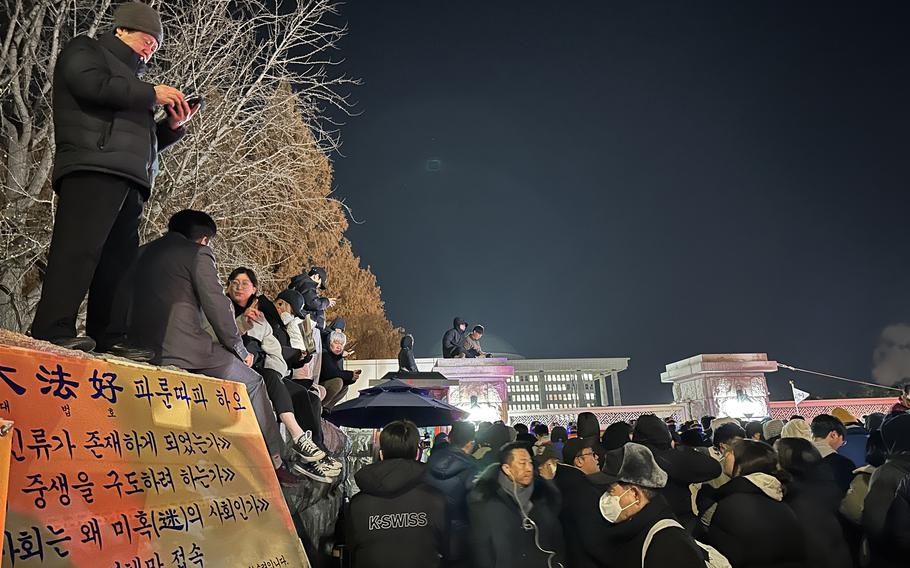
Activists and observers gather around a gate leading to the National Assembly building in Seoul, South Korea, Dec. 4, 2024. (David Choi/Stars and Stripes)
SEOUL, South Korea — Soldiers dispatched to South Korea’s parliament building to enforce President Yoon Suk Yeol’s abrupt martial law decree Tuesday night grew confused as the attempt evaporated in the face of legislative resistance.
Troops reportedly blocked some lawmakers from entering the National Assembly, which eventually voted to demand Yoon rescind the emergency order. Posts on social media showed some lawmakers climbing the compound walls, with protestors’ help, to evade soldiers and cast their votes.
The six-hour ordeal was “bizarre and embarrassing,” said retired South Korean army Lt. Gen. Chun In-Bum.
“It’s embarrassing because if you’re going to declare martial law, you should do it right,” he told Stars and Stripes by phone Wednesday. “Instead, they do it halfway and during the whole process, we’re just blessed that nothing went wrong, and nobody got killed.”
Yoon declared emergency martial law through a televised speech Tuesday night, citing a growing number of senior prosecutors being impeached and alleged political malfeasance by the opposition Democratic Party, a group he described as “anti-state” forces.
Nearly 300 special forces troops were deployed to the National Assembly following the declaration, some arriving by helicopter and forcibly entering the compound, National Assembly Secretary General Kim Min-ki said at a Wednesday news conference in Seoul.
“Starting today, we will completely ban military officials and police from entering the National Assembly building,” he said. “This is an urgent measure to protect the safety of lawmakers and to secure the functions of the National Assembly.”
South Korea’s Ministry of National Defense did not respond to requests for comment by phone Wednesday.
Under South Korean law, the president is required to lift martial law if at least half of the 300 National Assembly lawmakers vote against the declaration. All 190 lawmakers who were able to enter parliament in time voted against martial law.
Rep. Kim Joon Hyung of the Rebuilding Korea Party was among those who rushed to cast their votes; he described events that night as a complete surprise.
“Regarding martial law, there was a rumor, but nobody believed it,” he told Stars and Stripes by phone Wednesday. “I drove fast to come into the National Assembly building, but it was already blocked.”
The scene at the building’s entrance was chaotic, with some lawmakers allowed entry and others blocked by soldiers, Kim said. He overheard conflicting orders over the soldiers’ walkie-talkies, with some told to “block them” and another voice saying, “Let them in,” he said.
“It wasn’t really planned and thoroughly prepared because blocking the gate was not consistent,” Kim said. “The soldiers raiding were very scary and fearful, but I don’t think they acted fast enough. It seemed like they didn’t do their best or they were not being very aggressive.”
Troops deployed to the National Assembly apparently were not adequately briefed on their orders, according to Chun. Such an operation requires “meticulous planning,” he said.
“If you’re going to tell your troops to do something, your troops need to understand what they’re doing,” Chun said. “Everything was left to circumstance and on-the-spot decision making. Do you know how dangerous that is?”
Opposition to Yoon appeared to swell Wednesday.
Lawmakers from all six opposition parties filed a motion to impeach Yoon through the National Assembly that afternoon and told reporters they plan to bring it to a vote as early as Friday. Impeaching a president requires 200 votes, according to South Korea’s constitution.
Senior officials, including national security adviser Shin Won-sik and Yoon’s chief of staff, Chung Jin-suk, offered their resignations, Yonhap News reported Wednesday.
Yoon may have been “motivated by some kind of anger” and “definitely didn’t judge the situation very well,” Kim said.
“I think this is the end of Yoon’s presidency,” he said, “The question is how it ends.”
Stars and Stripes reporter Yoo Kyong Chang contributed to this report.